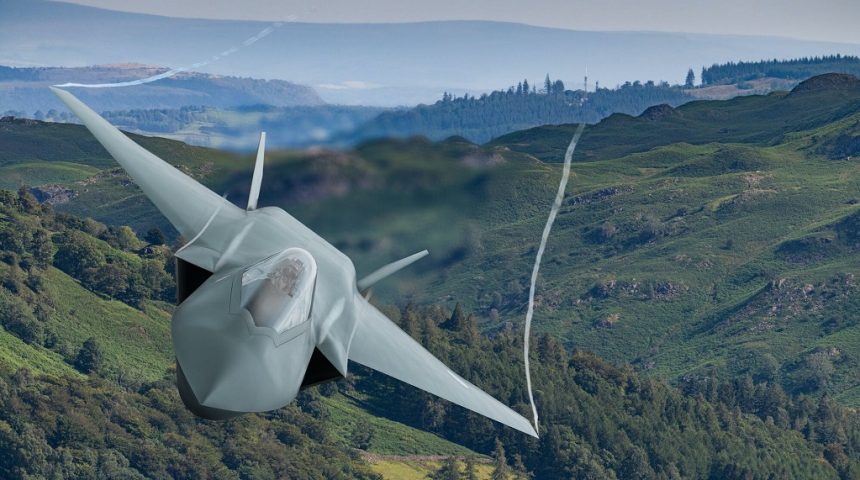With this new contract the Tempest programme will now progress to the next phase that will shape the final design and capabilities of the 6th gen aircraft.
The British Ministry of Defence awarded BAE Systems a contract worth £250 million to formally begin the Concept and Assessment Phase of the Tempest 6th generation aircraft program, part of the Future Combat Air System (FCAS). This contract is just the initial part of a bigger £2 billion investment that the United Kingdom Government has planned over the next four years in the recent Defence Command Paper.
This next phase of the Tempest programme will see investment in both digital and physical infrastructure on which the system will be developed, giving priority to the digital aspect as simulated design and testing can significantly reduce costs, time and emissions. The industry partners of Team Tempest will develop this way a range of digital concepts, embedding new tools and techniques to design, evaluate and shape the final design and capability requirements of Tempest.
“Today marks a momentous step in the next phase of our Future Combat Air System, with a multi-million pound investment that draws on the knowledge and skills of our UK industry experts. Boosting our already world-leading air industry, the contract will sustain thousands of jobs across the UK and will ensure that the UK remains at the top table when it comes to combat air”, said Ben Wallace, UK Secretary of State for Defence, when he announced the contract during a visit to BAE Systems’ Warton site.
BAE Systems’ facilities in Warton are the centre of development for the Tempest programme and also home to the so-called “Factory of the Future”, a first-of-its-kind, fully connected, digital factory created by BAE Systems with state-of-the-art Industry 4.0 technology to demonstrate a revolutionary approach to the manufacturing of military aircraft in the future. BAE Systems is one of the four founding members of Team Tempest, which also includes partners Leonardo UK, Rolls Royce and MBDA UK.
“Working with our industry partners and the Ministry of Defence, we are on track to deliver an ambitious programme for the UK, which will provide a highly advanced and sophisticated air defence capability, capable of countering future threats and safeguarding our national security and defence”, said Chris Boardman, Group Managing Director of BAE Systems’ Air Sector. “The funding announced today marks a critical next step for the programme and, with our partners, we will work together to define the technical and capability requirements and develop the concept which will bring Tempest to life. Tempest offers an exciting opportunity for the next generation of talent to develop rewarding careers, contributing to important work in support of the defence of our nation. The coming years represent one of the most exciting periods in the history of our industry and, as a team, we have a chance to be part of something genuinely historic, transforming the way we develop and deliver.”

Leonardo also welcomed the news about the contract, which underlines the UK Government’s confidence in the progress and maturity of the Tempest programme. “In 2018, the four UK industry partners came together with the MOD to form Team Tempest, embarking on an exciting and ambitious national project to deliver the next generation of combat air”, said Norman Bone, Chair and Managing Director of Leonardo UK . “Since then, we have made great strides towards that goal, with new technologies developed and demonstrated, and transformational new ways of working established across a digital enterprise. Italy and Sweden have joined as international partners, reinforcing the project and establishing FCAS as a major international endeavour. Today, the UK’s commitment has been reaffirmed, and I’m delighted that Leonardo will remain at the core of the programme as we transition to the FCAS concept and assessment phase.”
According to the Royal Air Force’s press release, the Concept and Assessment phase will define and begin to design the Future Combat Air System, mature technologies across the system, invest in skilled workforce that will work on the project, secure digital and physical infrastructure and tools that underpin cutting-edge digital engineering, data and software-based systems and, finally, enable major programme choices by 2024.
Tempest and FCAS will be equipped with cutting-edge technologies that are currently being developed by the industry partners to meet the capability requirements of future conflicts and be operational in the mid-2030s. Among them, we can find Artificial Intelligence, machine learning and autonomous systems that will pioneer human-AI teaming, a new Multi-Function Radar Frequency System technology that will reportedly collect and process 10’000 times more data than existing systems, a revolutionary “wearable cockpit” powered by Augmented and Virtual Reality systems projected inside the pilot’s helmet, new advanced engine technologies and a “loyal wingman”, currently being developed as the Lightweight Affordable Novel Combat Aircraft (LANCA) concept.
Last year, the UK, Italy and Sweden signed a Memorandum of Understanding to collaborate on the project, transforming the British FCAS project in a major international endeavour. Together the three countries aspire to develop the concepts, sharing workload while maximising their national expertise as they strive towards a common goal. The goal of the MoU is to have an equal participation of the signatory countries in the activities related to Tempest, with positive effects on each own defense industry, small and medium enterprises, research institutes and universities.
The Tempest programme is currently among the priorities of the three governments, which are now working to obtain a widespread industry participation to bring the best expertise to work on the many technology demonstrations currently in progress, while looking at the Project Arrangement and the beginning of the Full Development phase from 2025. Tempest is expected to replace the Eurofighter Typhoon (in Italy and UK) and the Saab Gripen (in Sweden).
Earlier this year, it was reported that the UK was looking at Japan to join the Tempest FCAS program and this was later confirmed by the MoD, acknowledging that important cooperative opportunities with Japan were being explored. Last week, the UK Defence Secretary visited Tokyo and agreed with Japanese Defence Minister Nobuo Kishi to accelerate discussions between the UK and Japan on developing sub-systems for a Future Combat Air System, including intensifying efforts to explore working together on power and propulsion systems.









